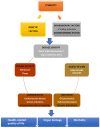Long-term outcomes in systemic lupus erythematosus: trends over time and major contributors
- PMID: 33280012
- PMCID: PMC7719040
- DOI: 10.1093/rheumatology/keaa382
Long-term outcomes in systemic lupus erythematosus: trends over time and major contributors
Abstract
SLE is a chronic autoimmune rheumatic disorder of high heterogeneity in clinical presentation, treatment response and prognosis. Long-term outcomes in SLE have been dramatically improved over the past decades, however, increased morbidity and mortality, especially among young individuals, still exists. Unmet needs include residual disease activity and frequent flares, glucocorticoid treatment dependency and toxicity, comorbidity burden, reduced health-related quality of life, health disparities and damage. The main determinants of long-term outcomes in SLE are age, sex, race/ethnicity, genetic profile, environmental factors including smoking, disease activity, major organ involvement such as lupus nephritis and CNS involvement, comorbidities including cardiovascular disease and serious infections, coexistence with APS, treatment adherence, socio-economic factors and access to care. In this review we discuss trends in long-term outcomes in SLE over the years and major contributors such as genetic, disease-related, treatment, comorbidity, socio-economic and other factors.
Keywords: SLE; comorbidities; damage; glucocorticoids; long-term outcomes; lupus nephritis; mortality; smoking; socio-economic factors; treatment adherence.
© The Author(s) 2020. Published by Oxford University Press on behalf of the British Society for Rheumatology.
Figures
References
-
- Durcan L, O’Dwyer T, Petri M. Management strategies and future directions for systemic lupus erythematosus in adults. Lancet 2019;393:2332–43. - PubMed
-
- Dörner T, Furie R. Novel paradigms in systemic lupus erythematosus. Lancet 2019;393:2344–58. - PubMed
-
- Tektonidou MG, Lewandowski LB, Hu J, Dasgupta A, Ward MM. Survival in adults and children with systemic lupus erythematosus: a systematic review and Bayesian meta-analysis of studies from 1950 to 2016. Ann Rheum Dis 2017;76:2009–16. - PubMed
Publication types
MeSH terms
LinkOut - more resources
Full Text Sources
Medical
Miscellaneous


